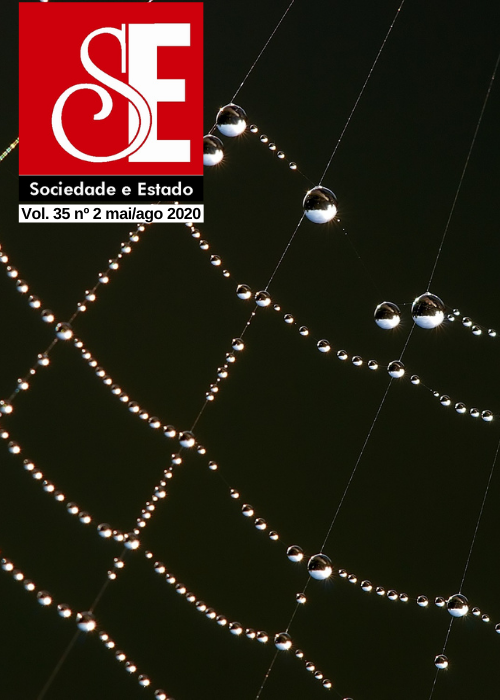The work of laboratories, the coal tar industry, and the current conception of scientific activity
DOI:
https://doi.org/10.1590/s0102-6992-202035020006Keywords:
industrial revolution, English scientific culture, Justus von Liebig, coal tar industry, industrial development in 19th centuryAbstract
The enduring link which exists between industry and science as we know it today only began to be established in the middle of the 19th century. In this article I argue that the establishment of this link occurred by means of a radical change in the very way of conceiving scientific activity. Thus, I show what was the new conception of scientific activity that appeared in the middle of the 19th century and ask how it came to be established. I suggest that the answer lies in the interweaving of two activities that did not exist until the 19th century: the systematic work of the laboratories, which only gained an institutional dimension in the 1830s, and the exploitation of coal tar for industrial goals, which only started in 1856.
Downloads
References
ASHTON, Rosemary. Victorian Bloomsbury. New Haven (CT); Londres: Yale University Press, 2012. [ Links ]
BERNAL, John Desmond. Science and industry in the nineteenth century. London: Routledge, 2011 [1953]. [ Links ]
_____. The scientific and industrial revolutions. Cambridge (MA): The MIT Press, 1971 [1954]. [ Links ]
CARRIÈRE, J. (Ed.). Berzelius und Liebig: Ihre Briefe von 1831-1845 (Munich e Leipzig). In: FRUTON, Joseph S. The Liebig Research Group: a reappraisal. Proceedings of the American Philosophical Society, v. 132, n. 1, p. 1-66, 1988. [ Links ]
COLLIE, John Norman. A century of chemistry at University College, sixth of a series of centenary adresses. In: Centenary adresses bound together in one volume. London: University of London Press, 1927. [ Links ]
DEWAR, J. Applied chemistry, english and foreign. Abstract from Presidential Address. In: GARDNER, Walter M. The British coal-tar industry, its origin, development, and decline. London: Wiliams and Norgate, 1915 [1902]. [ Links ]
FRUTON, Joseph S. The Liebig Research Group: a reappraisal. Proceedings of the American Philosophical Society, v. 132, n. 1, p. 1-66, 1988. [ Links ]
GARDNER, Walter M. The British coal-tar industry, its origin, development, and decline. London: Wiliams and Norgate, 1915. [ Links ]
GREEN, Arthur G. The relative progress of the coal-tar colour industry in England and German during the past fifteen years. In: GARDNER, Walter M. The British coal-tar industry, its origin, development, and decline. London: Wiliams and Norgate, 1915 [1901]. [ Links ]
HALL, A. Rupert. What did the Industrial Revolution in Britain owe to Science? In: MCKENDRICK, Neil (Ed.). Historical perspectives: studies in English Thought and Society in honour of J. H. Plumb, p. 129-151. London: Europa Publications, 1974. [ Links ]
JACOB, Margaret. Scientific culture and the making of industrial West. New York: Oxford University Press, 1997. [ Links ]
JACOB, Margaret; STUART, Larry. Practical matter: Newton’s science in the service of industry and Empire, 1687-1851. Cambridge (MA): Harvard University Press, 2004. [ Links ]
MAAR, Juergen Heinrich. Justus von Liebig. 1803-1873. Química Nova, v. 29, n. 5, p. 1129-1137, 2006. [ Links ]
MCKENDRIX, Neil. The role of science in the industrial revolution. In: TEICH, Mikulas; YOUNG, Robert (Orgs.). Changing perspectives in the history of science, p. 274-319. London: Heinemann, 1973. [ Links ]
MELDOLA, Raphael. The scientific development of the coal-tar industry. In: GARDNER, Walter M. The British coal-tar industry, its origin, development, and decline, p. 121-140. London: Wiliams and Norgate, 1915 [1886]. [ Links ]
MOKYR, Joel. The European enlightment, the Industrial Revolution, and modern economic growth. Conferência proferida em 27 Mar. 2007, Max Weber Lecture Series, European University. Disponível em: <https://sites.northwestern.edu/jmokyr/files/2016/06/The-European-Enlightenment-the-Industrial-Revolution-and-Modern-Economic-Growth-2007-2j6gh1e.pdf>. [ Links ]
_____. The intelectual origins of modern economic growth. Journal of Economic History, v. 65, n. 2, p. 285-351, 2005. [ Links ]
MORRELL, John Bowes. The chemist breeders: the research schools of Liebig and Thomas Thomson. Ambix, v. 19, p. 1-46, 1972. [ Links ]
MUSSON, Albert E.; ROBINSON, Eric. Science and technology in the Industrial Revolution. Manchester (UK): Manchester University Press, 1969. [ Links ]
PLAYFAIR, Lyon. Personal reminiscences of Hofmann and of the conditions which led to the establishment of the Royal College of Chemistry and the appointment of its professor. Journal of the Chemical Society, Transactions, v. LXIX, Parte I, p. 575-579, 1896. [ Links ]
ROBERTS, Gerrylynn K. The establishment of the Royal College of Chemistry: an investigation of the social context of early-victorian chemistry. Historical Studies in the Physical Sciences, v. 7, p. 437-485, 1976. [ Links ]
ROSCOE, Henry. Recent progress in the coal-tar industry, discourse delivered at the Royal Institute, 1886. In: GARDNER, Walter M. The British coal-tar industry, its origin, development, and decline. London: Wiliams and Norgate, 1915. [ Links ]
SINGER, I. The coal-tar colour industry of England: causes of its progresses and retardation. In: GARDNER, Walter M. The British coal-tar industry, its origin, development, and decline, p. 284. London: Wiliams and Norgate, 1915 [1910]. [ Links ]
STEWART, Larry. The selling of Newton: science and technology in early eighteenth-century England. Journal of British Studies, v. 25, n. 2, p. 178-192, 1986. [ Links ]
TILDE, William A. The supply of chemicals to Britain and her dependences. In: GARDNER, Walter M. The British coal-tar industry, its origin, development, and decline. London: Wiliams and Norgate, 1915 [1914]. [ Links ]
WEBER, Max. General economic history. London: Transaction Publishers, 2003 [1923]. [ Links ]











